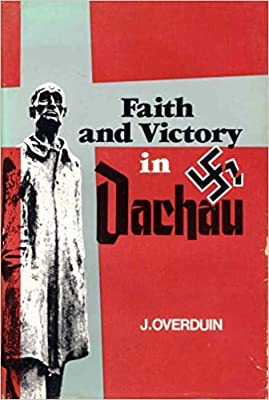A Powerful World War 2 Resistance Story


Faith and Victory in Dachau, Jack Overduin. St. Catharines: Paideia Press, 1978.
Back in 2018 and early 2019, dark times seemed to threaten Christian education in the Canadian province of Alberta. The radically left-leaning NDP government of Rachel Notley was pressuring Christian schools to abandon biblical teaching about sexual orientation and gender identity. There were threats of not only defunding, but also removing the accreditation of Christian schools. All of this was thankfully averted by the sound defeat of the NDP in the April 2019 provincial election.
Today other threats are looming in both Canada and Australia. In both countries, there’s impending legislation in relation to so-called “conversion therapy.” Canada’s legislation is being discussed in federal parliament (Bill C-6); in Australia the legislation is being put forward in the state of Victoria, but with potential impact across Australia. Such legislation would make it illegal even to pray with someone who struggles with their sexual orientation or gender identity. Offences under this legislation could result in prison sentences. This is another thinly veiled attack against Bible-believing Christians, churches, families and education.
In times like this, the temptation is strong to lie down and play dead. We might hope that we can just quietly go on with our lives and the powers that be will just ignore us in our little corner of society. However, their agenda is clear. They won’t stop until they bring us to heel. That means bringing us to celebrate and affirm their ideology in every corner of life. It’s a totalitarian agenda.
We need stories from our past to inspire us to resist the temptation to give up and give in. Jack Overduin’s Faith and Victory in Dachau is one such story. Overduin was a pastor in the Reformed Churches in the Netherlands (Gereformeerde Kerken in Nederland) during the Nazi occupation. While he was serving the church at Arnhem, the Nazi occupiers tried to seize control of the local Christian school. One of the teachers was a Nazi sympathizer. He made accusations against the principal. That led to the attempted Nazi take-over. When the school board resisted, two of its members were arrested and control of the school was turned over to the Nazi education department in the Netherlands. When this happened, the parents refused to send their children to the school and the teachers refused to teach.
Rev. Overduin was convinced that he had to provide leadership to his congregation at that moment. He prepared a sermon on a relevant Bible passage. As he climbed the pulpit, he spotted two Gestapo agents sitting in the pews. He had a choice. He could boldly preach what he prepared and face the consequences, or he could back down and remain relatively free. He chose the former. After the sermon the congregation sang, “A Mighty Fortress is Our God,” the famous hymn by Martin Luther.
Some days later Overduin was arrested by the Gestapo. The rest of the book describes his initial imprisonment in Arnhem, his transfer to a camp in Amersfoort, a brief time in Nuremburg, and then finally a lengthy stay in the hellish concentration camp of Dachau. This part of the book vividly describes the brutality of many of the Nazis, but also the surprising humanity of a few others. Eventually, in late 1943, Overduin was released from Dachau and allowed to return home to Arnhem.
If you have a Dutch Reformed heritage like I do, this book will resonate with you. It’ll give you a profound insight into how our forefathers resisted Nazi totalitarianism and the price some were willing to pay. It’ll embolden you to do the same in our day against the totalitarian forces we’re facing. However, even if you don’t have such a heritage, seeing Christians of deep conviction standing up to resist anti-Christian persecution should be inspirational.
Throughout Overduin made it clear that we shouldn’t look at him as a hero. His story is really a story about the power of Christ in the lives of his people. In his grace, Christ gives the power to resist evil forces which seek to destroy the gospel. He concludes, “My prayer is that this story has made a God-glorifying impression on you, and that you will say with me, ‘How great and good Christ is, how faithful and merciful!’” (p.252).
I need to make a couple of remarks to finish off. First, in a number of places, Overduin spoke quite favourably about some Roman Catholics he encounters in Nazi custody. Two of these Roman Catholics die and he speaks about them going to heaven. In a spirit of Christian charity, I’ll assume Overduin said this because he personally heard these men profess faith in Christ alone as the only Saviour.
My other remark has to do with another struggle against oppression taking place around the same time, this one in the church. During the Nazi occupation, there was a doctrinal and church political struggle going on in the Reformed Churches. Synods made heavy-handed doctrinal declarations that were imposed upon the churches. When ministers like Klaas Schilder refused to fall in line, a synod suspended and then deposed him, even though this was contrary to the agreed-upon Church Order. This resulted in the Liberation of 1944. Jack Overduin didn’t agree with the Liberation. After the Second World War, he continued to be a minister in the so-called synodical churches. It’s regrettable that Overduin didn’t take the same bold stand against synodical oppression that he took against the Nazis. Nevertheless, I don’t think that takes away from the value of Faith and Victory in Dachau. In fact, in my lifetime it’s never been more relevant than it is today.


